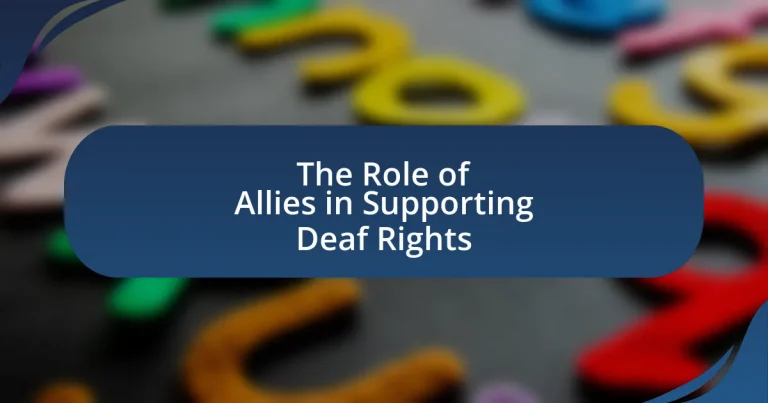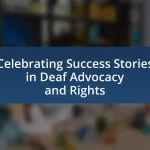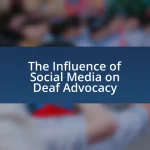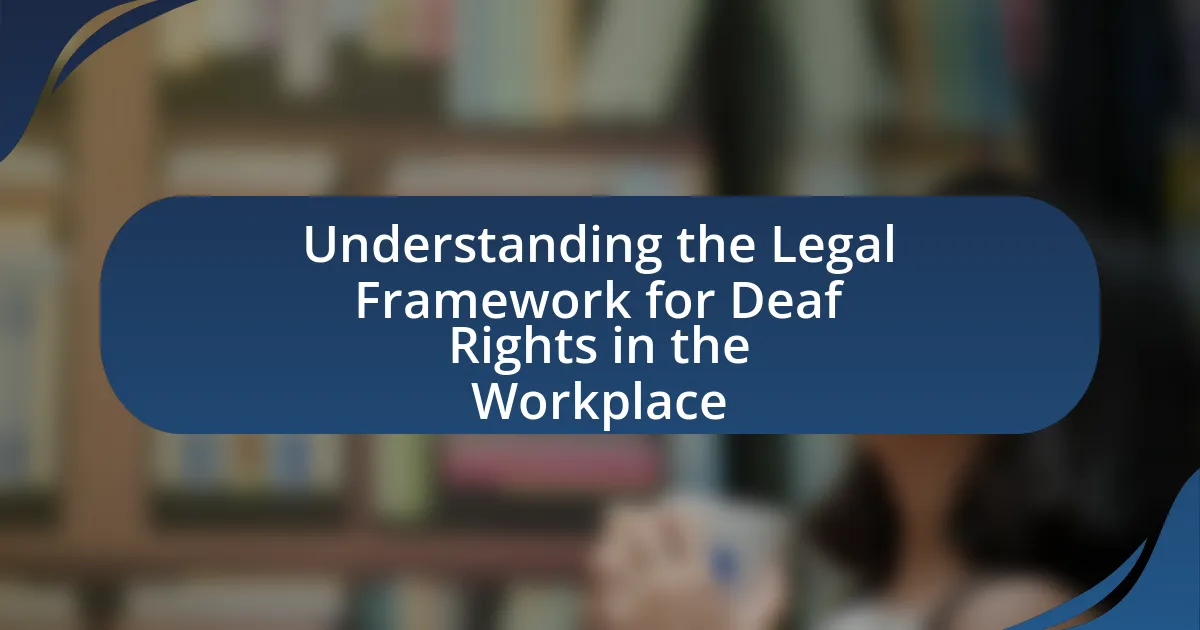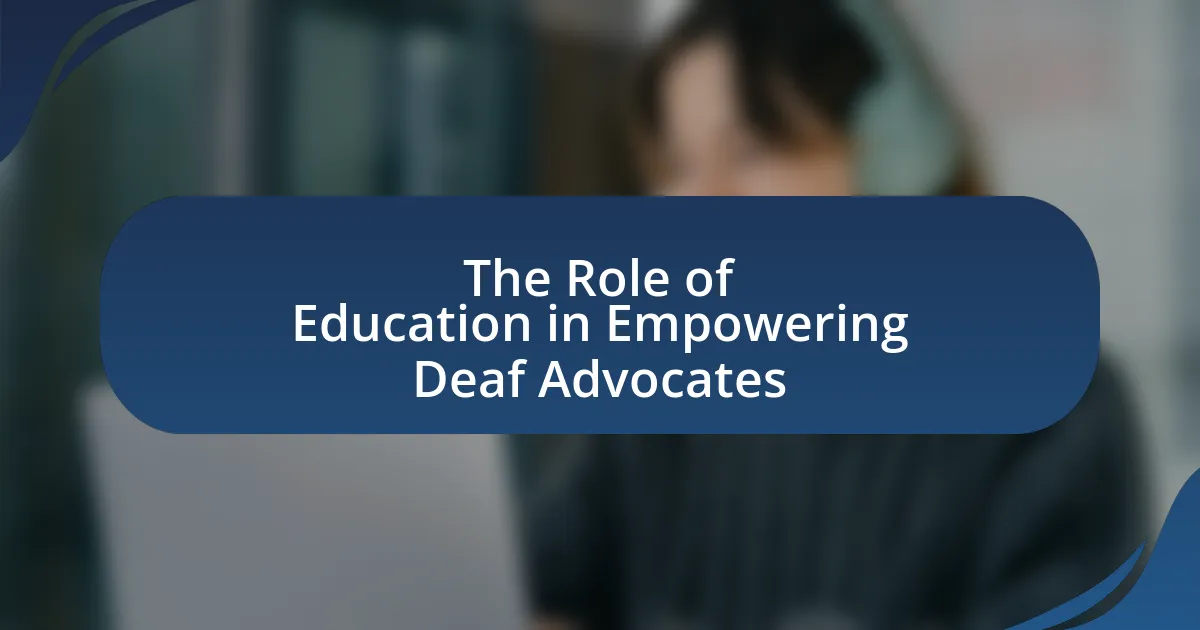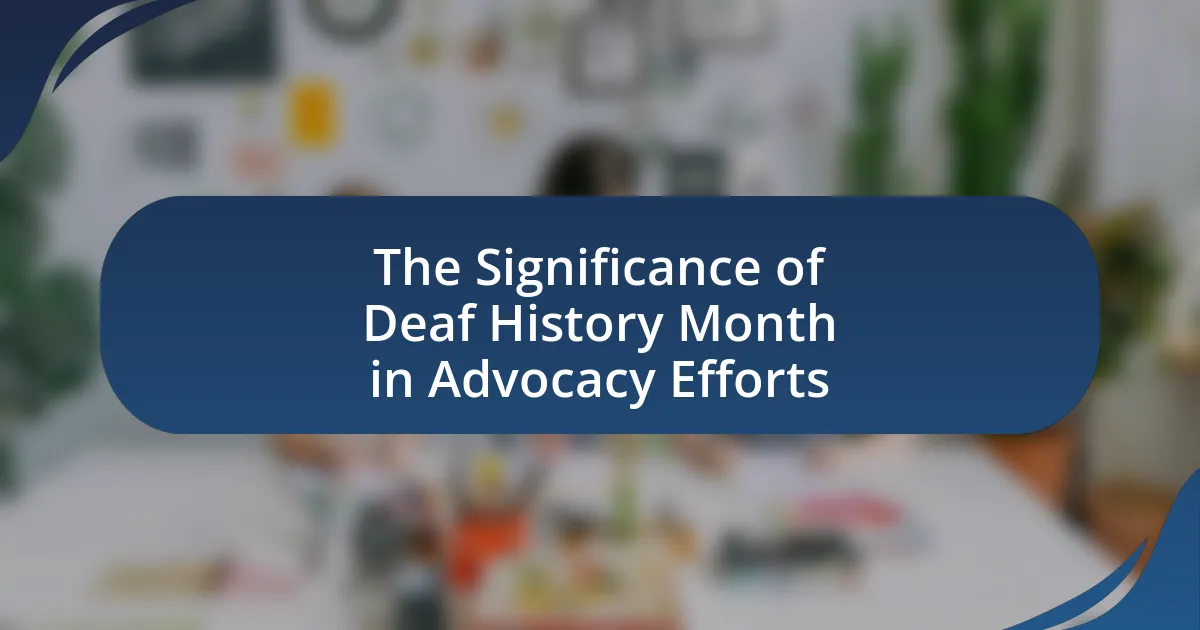The article focuses on the critical role of allies in supporting Deaf rights, emphasizing their importance in amplifying Deaf voices and advocating for inclusivity within society. It outlines the specific challenges faced by Deaf individuals, such as communication barriers and limited access to services, and highlights how allies can address these issues through advocacy, education, and active participation in Deaf-led initiatives. Key responsibilities of allies include promoting accessibility, understanding Deaf culture, and ensuring that Deaf perspectives are prioritized in discussions affecting their rights. The article also discusses effective strategies for allies to engage meaningfully with the Deaf community and the resources available for further education on Deaf rights.
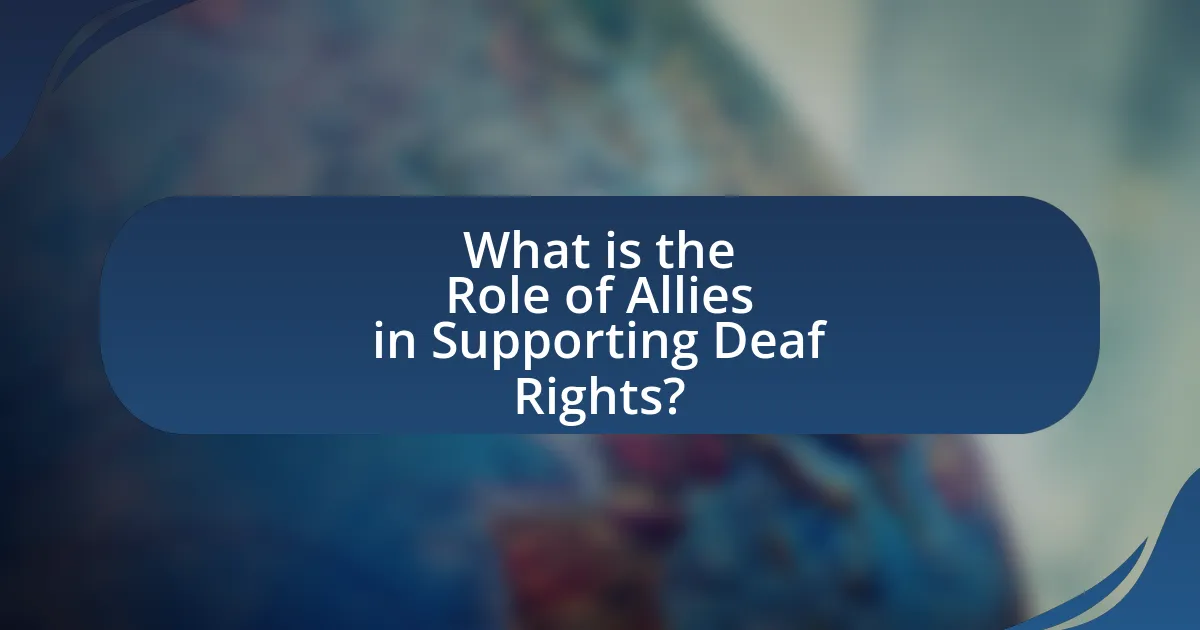
What is the Role of Allies in Supporting Deaf Rights?
Allies play a crucial role in supporting Deaf rights by amplifying the voices of Deaf individuals and advocating for their inclusion in society. They help raise awareness about the challenges faced by the Deaf community, such as accessibility issues and discrimination, thereby fostering a more inclusive environment. For instance, allies can support legislation that promotes equal access to education and employment for Deaf individuals, as seen in the Americans with Disabilities Act, which mandates reasonable accommodations. Additionally, allies can educate themselves and others about Deaf culture and sign language, which enhances communication and understanding. By actively participating in advocacy efforts and standing in solidarity with the Deaf community, allies contribute significantly to the advancement of Deaf rights and social justice.
Why are allies important in the context of Deaf rights?
Allies are important in the context of Deaf rights because they amplify the voices of Deaf individuals and advocate for their rights within broader societal frameworks. Allies help to challenge misconceptions about Deaf culture and promote accessibility, ensuring that Deaf individuals have equal opportunities in education, employment, and social participation. Research indicates that when allies actively support Deaf rights, it leads to increased awareness and policy changes that benefit the Deaf community, such as the implementation of sign language interpreters in public services and workplaces. This collaborative effort fosters inclusivity and helps dismantle systemic barriers faced by Deaf individuals.
What specific challenges do Deaf individuals face that allies can help address?
Deaf individuals face communication barriers, social isolation, and limited access to services, which allies can help address. Communication barriers arise from a lack of understanding of sign language among hearing individuals, making it difficult for Deaf individuals to express themselves and access information. Social isolation is often a result of societal attitudes and misconceptions about Deaf culture, leading to exclusion from social interactions and community events. Limited access to services, such as healthcare and education, occurs when providers do not accommodate Deaf individuals’ needs, such as offering interpreters or accessible materials. Allies can advocate for the inclusion of sign language in public services, promote awareness of Deaf culture, and support policies that ensure equal access to resources, thereby helping to mitigate these challenges.
How can allies amplify the voices of Deaf individuals?
Allies can amplify the voices of Deaf individuals by actively promoting their rights and ensuring their perspectives are included in discussions that affect them. This can be achieved through various means, such as advocating for the use of sign language in public spaces, supporting Deaf-led organizations, and participating in awareness campaigns that highlight Deaf culture and issues. Research indicates that when allies engage in these actions, they help create a more inclusive environment, which is essential for the empowerment of Deaf communities. For instance, a study by the National Association of the Deaf emphasizes the importance of allyship in fostering accessibility and representation, demonstrating that effective allyship leads to increased visibility and respect for Deaf individuals’ contributions.
What are the key responsibilities of allies in supporting Deaf rights?
Allies in supporting Deaf rights have several key responsibilities, including advocating for accessibility, amplifying Deaf voices, and educating themselves and others about Deaf culture and issues. Advocating for accessibility involves ensuring that public spaces, services, and information are accessible to Deaf individuals, which is supported by the Americans with Disabilities Act (ADA) that mandates equal access. Amplifying Deaf voices means actively listening to and promoting the perspectives and needs of Deaf individuals in discussions and decision-making processes. Educating oneself and others about Deaf culture and issues fosters understanding and respect, which is essential for effective allyship. These responsibilities contribute to a more inclusive society that respects and upholds the rights of Deaf individuals.
How can allies educate themselves about Deaf culture and issues?
Allies can educate themselves about Deaf culture and issues by actively engaging with Deaf communities and resources. This includes attending Deaf events, such as festivals and workshops, where they can interact with Deaf individuals and learn about their experiences firsthand. Additionally, allies should read literature and research on Deaf culture, such as “Deaf Culture: Exploring Deaf Communities in the United States” by Irene W. Leigh, which provides insights into the values and norms of Deaf communities. Online platforms, such as social media groups and websites dedicated to Deaf advocacy, also offer valuable information and perspectives. Engaging with Deaf individuals through conversations and asking respectful questions can further enhance understanding and awareness of Deaf issues.
What actions can allies take to advocate for Deaf rights?
Allies can advocate for Deaf rights by actively promoting accessibility and inclusion in various settings. This includes supporting legislation that mandates sign language interpretation in public services and workplaces, which is crucial for ensuring equal access to information and opportunities for Deaf individuals. Additionally, allies can educate themselves and others about Deaf culture and the challenges faced by the Deaf community, fostering a more inclusive environment. Research indicates that increased awareness and understanding can lead to better advocacy outcomes, as seen in initiatives that have successfully improved access to education and employment for Deaf individuals.
How do allies contribute to the empowerment of Deaf communities?
Allies contribute to the empowerment of Deaf communities by advocating for accessibility, promoting awareness, and supporting Deaf-led initiatives. Their advocacy efforts often lead to policy changes that enhance communication access, such as the implementation of sign language interpreters in public services and educational institutions. For instance, research shows that increased visibility of Deaf culture and language in media, driven by allies, fosters a more inclusive society. Additionally, allies often provide resources and funding for Deaf organizations, which enables these communities to thrive and assert their rights more effectively.
What role does allyship play in promoting accessibility for Deaf individuals?
Allyship plays a crucial role in promoting accessibility for Deaf individuals by advocating for their rights and ensuring inclusive environments. Allies help bridge communication gaps by supporting the implementation of sign language interpreters, captioning services, and other accessibility measures in various settings, such as workplaces and educational institutions. Research indicates that when allies actively engage in promoting Deaf accessibility, it leads to increased awareness and understanding of Deaf culture, which fosters a more inclusive society. For instance, a study by the National Association of the Deaf highlights that workplaces with strong allyship programs report higher levels of job satisfaction and retention among Deaf employees, demonstrating the tangible benefits of allyship in enhancing accessibility.
How can allies support Deaf-led initiatives and organizations?
Allies can support Deaf-led initiatives and organizations by actively promoting and participating in their events and campaigns. This involvement not only raises awareness but also amplifies the voices of Deaf individuals, ensuring their perspectives are prioritized. For instance, allies can share information about Deaf-led projects on social media, attend workshops, and contribute to fundraising efforts. Research indicates that increased visibility and support from allies can significantly enhance the sustainability and impact of Deaf organizations, as seen in the success of initiatives like the National Association of the Deaf, which relies on ally engagement for broader outreach and advocacy.
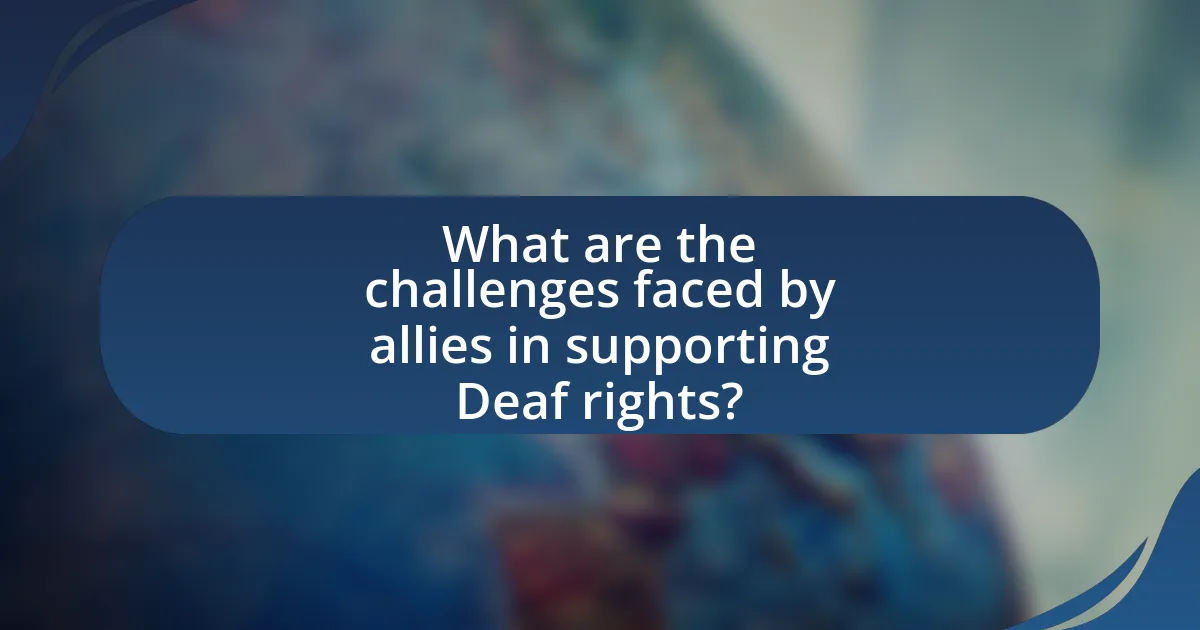
What are the challenges faced by allies in supporting Deaf rights?
Allies face several challenges in supporting Deaf rights, primarily due to communication barriers, societal misconceptions, and a lack of awareness about Deaf culture. Communication barriers arise when allies are not proficient in sign language, which can hinder effective advocacy and support. Societal misconceptions often lead to the marginalization of Deaf individuals, making it difficult for allies to challenge stereotypes and promote inclusivity. Additionally, a lack of awareness about Deaf culture can result in allies unintentionally perpetuating harmful practices or failing to recognize the unique needs of the Deaf community. These challenges highlight the necessity for allies to engage in continuous education and active listening to effectively support Deaf rights.
What misconceptions do allies often encounter?
Allies often encounter the misconception that their support alone is sufficient for advancing Deaf rights. This belief undermines the importance of actively listening to and amplifying the voices of Deaf individuals, who are the primary stakeholders in their own advocacy. Research indicates that effective allyship requires ongoing education and engagement with the Deaf community, rather than a one-time effort or superficial involvement. For instance, a study by the National Association of the Deaf highlights that allies must recognize their role as facilitators rather than leaders in the movement, ensuring that Deaf perspectives are prioritized in discussions and decision-making processes.
How can allies overcome stereotypes about Deaf individuals?
Allies can overcome stereotypes about Deaf individuals by actively educating themselves and others about Deaf culture and communication methods. This involves learning sign language, understanding the diverse experiences within the Deaf community, and challenging misconceptions through informed discussions. Research indicates that increased awareness and knowledge can significantly reduce stigma; for example, a study published in the Journal of Deaf Studies and Deaf Education found that exposure to Deaf culture positively influences attitudes toward Deaf individuals. By fostering inclusive environments and advocating for Deaf rights, allies can effectively dismantle harmful stereotypes.
What are the barriers to effective allyship in the Deaf community?
Barriers to effective allyship in the Deaf community include a lack of understanding of Deaf culture, inadequate communication skills, and societal misconceptions about deafness. Many potential allies may not be familiar with the nuances of Deaf culture, which can lead to unintentional disrespect or miscommunication. Additionally, allies often lack proficiency in sign language, making it difficult to engage meaningfully with Deaf individuals. Societal misconceptions, such as viewing deafness solely as a disability rather than a cultural identity, further hinder the ability of allies to advocate effectively. These barriers can prevent allies from fully supporting Deaf rights and participating in the community.
How can allies navigate their role without overshadowing Deaf voices?
Allies can navigate their role without overshadowing Deaf voices by actively listening to and amplifying those voices rather than speaking over them. This involves prioritizing the perspectives and experiences of Deaf individuals in discussions and decision-making processes that affect their lives. For instance, allies should seek to create platforms where Deaf individuals can share their stories and insights, ensuring that these narratives are front and center in advocacy efforts. Research indicates that effective allyship includes recognizing the importance of representation; a study by the National Association of the Deaf highlights that when Deaf individuals lead initiatives, the outcomes are more aligned with their needs and rights. Thus, allies must focus on supporting and elevating Deaf leadership to foster genuine collaboration and respect.
What strategies can allies use to ensure they are not speaking over Deaf individuals?
Allies can ensure they are not speaking over Deaf individuals by actively listening and allowing Deaf individuals to express themselves without interruption. This involves maintaining eye contact, using appropriate communication methods such as sign language or written communication, and being mindful of the conversation dynamics. Research indicates that effective communication strategies, such as using visual aids and ensuring an inclusive environment, enhance understanding and respect for Deaf individuals’ perspectives. By prioritizing these strategies, allies can foster a more equitable dialogue that values Deaf voices.
How can allies balance their advocacy with respect for Deaf autonomy?
Allies can balance their advocacy with respect for Deaf autonomy by actively listening to Deaf individuals and prioritizing their perspectives in advocacy efforts. This approach ensures that the needs and preferences of the Deaf community are central to any initiatives or support provided. Research indicates that effective allyship involves recognizing the expertise of Deaf individuals regarding their own experiences and challenges, which fosters empowerment and self-determination. For instance, the National Association of the Deaf emphasizes the importance of involving Deaf people in decision-making processes that affect their lives, reinforcing the principle that advocacy should amplify, rather than overshadow, Deaf voices.
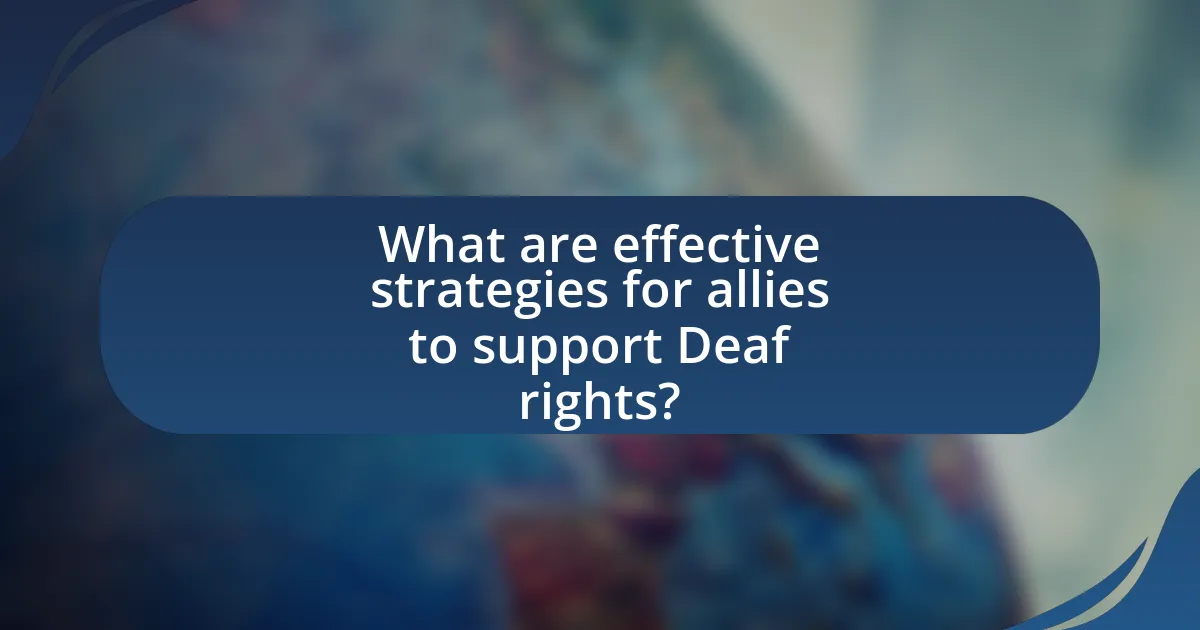
What are effective strategies for allies to support Deaf rights?
Effective strategies for allies to support Deaf rights include advocating for accessibility, promoting Deaf culture, and amplifying Deaf voices in decision-making processes. Allies can advocate for accessibility by ensuring that public spaces, events, and digital content are equipped with sign language interpreters and captions, which aligns with the Americans with Disabilities Act that mandates equal access for individuals with disabilities. Promoting Deaf culture involves educating themselves and others about Deaf history, language, and community values, which fosters respect and understanding. Additionally, allies should amplify Deaf voices by supporting Deaf-led organizations and initiatives, ensuring that Deaf individuals are included in discussions that affect their rights and lives, as research shows that representation leads to more effective advocacy outcomes.
How can allies engage in meaningful conversations about Deaf rights?
Allies can engage in meaningful conversations about Deaf rights by actively listening to Deaf individuals and prioritizing their perspectives. This approach fosters understanding and respect, which are essential for effective dialogue. Research indicates that when allies listen and validate the experiences of Deaf people, it leads to more productive discussions and stronger advocacy efforts. For instance, the National Association of the Deaf emphasizes the importance of recognizing the unique cultural and linguistic identity of the Deaf community, which can enhance allyship and support for Deaf rights.
What questions should allies ask to better understand Deaf perspectives?
Allies should ask questions such as, “What are your preferred communication methods?” to understand Deaf perspectives. This question acknowledges the diversity within the Deaf community regarding communication preferences, including sign language, written communication, or spoken language. Additionally, allies can inquire, “What barriers do you face in accessing services or information?” This question highlights the challenges Deaf individuals encounter in various environments, such as healthcare or education, emphasizing the need for inclusive practices. Furthermore, asking, “How can I support your advocacy efforts?” demonstrates a willingness to engage actively in promoting Deaf rights and amplifying Deaf voices. These questions are essential for fostering understanding and collaboration between allies and the Deaf community.
How can allies facilitate discussions that include Deaf voices?
Allies can facilitate discussions that include Deaf voices by actively ensuring accessibility and promoting inclusive communication methods. This involves using sign language interpreters, providing written materials, and creating environments where Deaf individuals feel comfortable expressing their views. Research indicates that inclusive practices lead to better engagement and representation of marginalized voices, as seen in studies highlighting the importance of accessibility in community dialogues. By prioritizing these methods, allies can effectively amplify Deaf perspectives and foster meaningful conversations.
What resources are available for allies to learn more about Deaf rights?
Allies can access various resources to learn about Deaf rights, including organizations, literature, and online platforms. Notable organizations such as the National Association of the Deaf (NAD) and the World Federation of the Deaf (WFD) provide comprehensive information on Deaf rights advocacy, legal protections, and community resources. Additionally, books like “Deaf Culture: Exploring Deaf Communities in the United States” by Irene W. Leigh and “The Deaf Way: Perspectives from the International Conference on Deaf Culture” offer insights into Deaf culture and rights. Online platforms, including webinars and social media groups, also facilitate discussions and education on Deaf rights issues. These resources collectively enhance understanding and support for the Deaf community.
Which organizations provide support and information for allies?
Organizations that provide support and information for allies include the National Association of the Deaf (NAD), which advocates for the rights of deaf individuals and offers resources for allies. Another key organization is the Hearing Loss Association of America (HLAA), which provides information and support for those with hearing loss and their allies. Additionally, the American Society for Deaf Children (ASDC) focuses on empowering families and allies of deaf children through education and resources. These organizations are recognized for their commitment to promoting awareness and providing guidance to allies in the deaf community.
What educational materials can allies utilize to enhance their understanding?
Allies can utilize a variety of educational materials to enhance their understanding of Deaf rights, including books, documentaries, online courses, and workshops. For instance, “Deaf Culture: Exploring Deaf Communities in the United States” by Irene W. Leigh provides insights into the cultural aspects of the Deaf community. Documentaries like “The Silent Child” illustrate the challenges faced by Deaf individuals and promote awareness. Online platforms such as Coursera offer courses on Deaf culture and sign language, which can deepen understanding. Workshops led by Deaf advocates also provide firsthand experiences and discussions that are crucial for allies seeking to support Deaf rights effectively.
What are some best practices for allies in supporting Deaf rights?
Allies can best support Deaf rights by actively listening to Deaf individuals and amplifying their voices. This involves prioritizing the perspectives and experiences of Deaf people in discussions about their rights and needs, ensuring that they are at the forefront of advocacy efforts. Additionally, allies should educate themselves about Deaf culture and American Sign Language (ASL), which fosters respect and understanding. Research indicates that effective allyship includes challenging ableism and advocating for accessibility in various environments, such as workplaces and public spaces. By promoting inclusive policies and practices, allies can help dismantle barriers faced by the Deaf community, thereby reinforcing their rights and autonomy.
How can allies effectively advocate for policy changes that benefit Deaf individuals?
Allies can effectively advocate for policy changes that benefit Deaf individuals by actively engaging in awareness campaigns and collaborating with Deaf communities to understand their needs. This approach ensures that advocacy efforts are informed by the lived experiences of Deaf individuals, which is crucial for creating relevant and impactful policies. Research indicates that inclusive advocacy, which incorporates the perspectives of those directly affected, leads to more effective policy outcomes (National Association of the Deaf, 2020). By leveraging their platforms, allies can amplify Deaf voices, promote accessibility, and push for legislative changes that address systemic barriers faced by Deaf individuals.
What are the most impactful ways for allies to show solidarity with the Deaf community?
Allies can show solidarity with the Deaf community by actively promoting and using sign language, advocating for accessibility in public spaces, and supporting Deaf-led organizations. Promoting sign language helps bridge communication gaps and fosters inclusion, as studies indicate that language access is crucial for the empowerment of Deaf individuals. Advocating for accessibility ensures that Deaf individuals can participate fully in society, as the Americans with Disabilities Act mandates equal access to services and facilities. Supporting Deaf-led organizations amplifies the voices of Deaf individuals and contributes to the advancement of their rights, as these organizations often lead initiatives that directly address the needs and concerns of the community.
